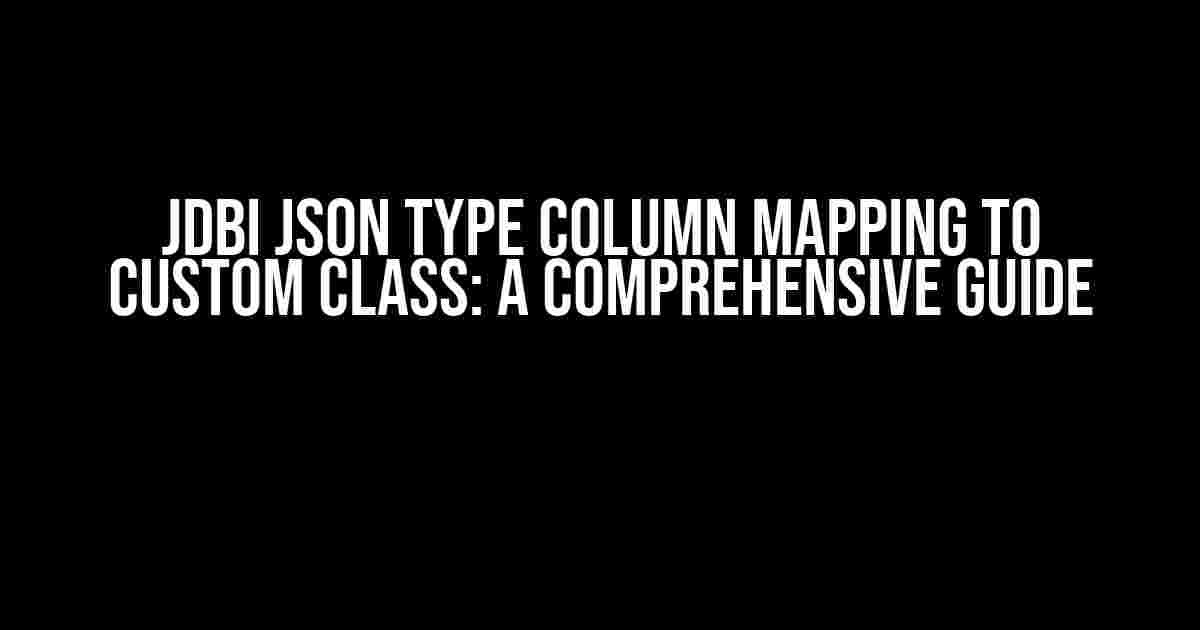When working with Java-based data access objects (DAOs) using JDBI, one of the common challenges is mapping JSON type columns to custom classes. In this article, we will explore the best practices and techniques for achieving this mapping efficiently.
Why do we need custom class mapping?
In many modern database systems, JSON data type columns are becoming increasingly popular due to their flexibility and ability to store complex data structures. However, when retrieving this data using JDBI, we need a way to map it to a custom class that can be easily consumed by our Java application.
Default Behavior of JDBI
By default, JDBI maps JSON type columns to the `String` type, which may not be desirable in many cases. This is because the JSON data is returned as a string, and we need to parse it manually to convert it to a usable Java object.
Custom Class Mapping using JDBI
To map JSON type columns to a custom class, we need to implement a custom `TypeMapper` that can convert the JSON data to an instance of our custom class. Here’s an example:
public class JsonTypeMapper implements TypeMapper<ResultSet> {
@Override
public MyClass map(int index, ResultSet r) throws SQLException {
String jsonString = r.getString(index);
MyClass myObject = gson.fromJson(jsonString, MyClass.class);
return myObject;
}
}In this example, we are using the Google Gson library to parse the JSON string to an instance of our custom class `MyClass`.
Registering the Custom TypeMapper
To register our custom `TypeMapper` with JDBI, we need to add it to the `DBI` instance:
DBI dbi = new DBI("jdbc:postgresql://localhost:5432/mydb", "username", "password");
dbi.registerTypeMapper(new JsonTypeMapper());Once registered, JDBI will use our custom `TypeMapper` to map JSON type columns to instances of our custom class.
Best Practices and Considerations
When implementing custom class mapping for JSON type columns, keep the following best practices and considerations in mind:
- Use a robust JSON parsing library like Gson or Jackson to handle complex JSON data structures.
- Ensure that your custom class has a no-argument constructor and getter/setter methods for each field.
- Consider using immutable objects to prevent unexpected changes to the data.
- Handle NULL values and potential JSON parsing errors gracefully.
By following these best practices and implementing a custom `TypeMapper`, you can efficiently map JSON type columns to custom classes using JDBI.
Conclusion
In this article, we have demonstrated how to map JSON type columns to custom classes using JDBI. By implementing a custom `TypeMapper`, we can efficiently convert JSON data to usable Java objects, making it easier to work with complex data structures in our Java applications.
Frequently Asked Question
Get ready to unravel the mysteries of JDBI Json type column mapping to custom class!
How do I map a Json type column to a custom class using JDBI?
You can map a Json type column to a custom class using JDBI by registering a custom type factory. This factory returns an instance of your custom class, and JDBI will use it to map the Json column to your custom class. For example, you can use a factory like this: `new ColumnMapperFactory(MyCustomClass.class, jsonMapper -> jsonMapper.readValue(column.getValue(), MyCustomClass.class))`.
What is the role of the `ColumnMapper` interface in JDBI when dealing with Json type columns?
The `ColumnMapper` interface is responsible for converting a database column value into a Java object. When working with Json type columns, you need to implement this interface to define how to map the Json data to your custom class. The `ColumnMapper` implementation will be used by JDBI to convert the Json column value to an instance of your custom class.
How do I handle nested Json structures in a custom class using JDBI?
To handle nested Json structures, you can use a Json mapper like Jackson or Gson to deserialize the Json data into your custom class. Your custom class can have nested objects or collections to reflect the Json structure. For example, if your Json column contains a nested structure like `{ “name”: “John”, “address”: { “street”: “Main St”, “city”: “Anytown” }}`, your custom class can have a nested `Address` class to represent the address data.
Can I use existing Json mappers like Jackson or Gson with JDBI to map Json type columns?
Yes, you can definitely use existing Json mappers like Jackson or Gson with JDBI to map Json type columns. In fact, JDBI provides built-in support for these mappers. You can configure JDBI to use these mappers to convert Json column values to your custom class. This approach can simplify the mapping process and leverage the power of these popular Json mappers.
How do I handle errors or malformed Json data when using JDBI to map Json type columns to a custom class?
When using JDBI to map Json type columns to a custom class, you should be prepared to handle errors or malformed Json data. You can use try-catch blocks to catch exceptions thrown during the mapping process. Additionally, you can implement error handling mechanisms, such as logging or default values, to handle invalid or malformed Json data. It’s essential to test your mapping code with various Json inputs to ensure it can handle different scenarios.

